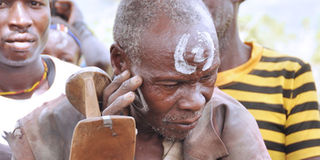Prime
Covid-19 slashes pension contributions to Shs353b

Uncertain. An old man in Karamoja. Photo/ERONIE KAMUKAMA
What you need to know:
Contributions continued on a downward trend with a 10.2 per cent drop from Shs394 billion in June to Shs353 billion in September.
Throughout 2020, the economy has taken a pounding from Coronavirus (Covid-19); which has significantly disrupted economic activity, resulting in loss of jobs and incomes.
Experts say the country is yet to know the full extent of the economic impact of Covid-19.
The retirement benefits sector has equally suffered the effects of the pandemic, but the regulator says many schemes have so far weathered the storm.
Mr Martin Nsubuga, chief executive officer at Uganda Retirement Benefits Regulatory Authority (URBRA), says the sector remained stable, performing relatively well in investment.
He explains that assets under management of the total retirement sector portfolio have grown by 8.5 per cent from Shs14.56 trillion in March 2020 to Shs15.8 trillion in September 2020.
“On a year-on-year basis, the sector portfolio grew by 16.8 per cent, from Shs13.5 trillion in September 2019 to Shs15.8 trillion as at September 2020,” he says.
Mr Nsubuga adds, “There was an increase in investment income from Shs375 billion in June 2020 to Shs421 billion in September 2020.”
This trend is attributed to prudent investment and improved scheme governance with a strong oversight of the regulator.
“We licensed three new retirement schemes but lost one scheme, bringing the number of licensed retirement benefits schemes to 68,” he says.
Also, the industry has seen a growth in the number of participating employers under licensed umbrella schemes, growing from 142 since December 2019 to 175 of December 2020.
“We have licensed more trustees since December 2019, with the number of trustees increasing from 146 to 234 as of December 2020. This reflects confidence in the supervisory framework and growth in scheme’s stewardship. We aspire to further enhance the competencies of these trustees through our Trustees’ Certification Program,” Nsubuga says.
Adverse effects of Covid-19
The retirement benefits sector faced a number of challenges as a result of Covid-19. Figures from the regulator show that contributions continued on a downward trend with a 10.2 per cent drop from Shs394 billion in June 2020 to Shs353 billion in September 2020.
There were also delays in contributions by some schemes in the education, hospitality and manufacturing sectors as the employers struggled to meet their operational costs.
Mr Nsubuga further explained that Bank of Uganda (BoU) suspended distribution of dividends by financial institutions, which affected the income streams of many schemes that had invested in financial services equities.
“Umeme, one of our largest local equity (accounting for 15 per cent of the equities) did not declare any dividends,” he says.
Notwithstanding, 51.7 per cent of quoted equities invested in the financial sector have registered slight recovery from the effects of Covid-19.
As a response to the effects of Covid-19 pandemic, schemes have reallocated their investment assets with a bias to government securities, to hedge against the overall negative performance of equities.
“Government securities, which account for over 75 per cent of the schemes’ assets, continue to provide a reliable safety net amidst the Covid-19 uncertainties. The yields on the government securities are rising. Given that most schemes hold these securities to maturity, we envisage more certainty to members’ returns even in the medium term,” Nsubuga said.
The Kenyan equities market (accounting for 70 per cent of the quoted equities for our Scheme) that experienced a consistent downward trend during the early months of Covid-19 is beginning to recover, though marginally.
Despite the low performance in the Kenyan equities, Safaricom, which accounts for a significant share (28.9 per cent) of the equities, is still growing strong amidst the current economic environment in the region.
URBRA also recorded a loss of three licensed trustees due to the decision by the employer to migrate their scheme to a licensed umbrella scheme, a move occasioned by effects of Covid-19.
“With changes in employers’ businesses, URBRA maintains a keen eye on scheme governance, monitoring the movement of trustees and engaging them,” the regulator says.
He adds; “To strengthen our sector oversight, the Authority continues to enhance its risk-based supervision capabilities to identify and prevent scheme risks in real time during our off site surveillance.”
Mr Wilbur Naigambi, the board chair at Makerere University Retirement Benefits Scheme (MURBS), says MURBS was affected by Covid-19 but he adds that not that much because we had earlier taken more courteous measures.
“We had been investing in treasury bonds and going forward, we shall be going for the less risky assets of investments,” he said.
Mr Patrick Byabakama Kaberenge, chairman, board of directors at National Social Security Fund, said the Covid-19 challenge and the lockdown in about six months affected members’ contributions.




